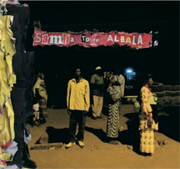The current conflict in Mali has meant that many musicians have fear picking up their instruments should they be targeted by Islamist militia for breaking sharia law. The situation is a major blow for a country where the culture is so rich and music is such a large part of people’s way of life. This tension is captured on the latest release from Malian guitarist Samba Touré, whose playing fizzes with rebellious menace throughout.
It is 10 years since Touré’s solo debut, Fondo, and in that time he has become a star in his homeland. His powerful desert blues is cut from the same cloth as his mentor Ali Farka Touré, whom Samba toured with in the late 90s, having previously cut his teeth with the group Farafina Lolo (African Star). Touré has also performed the late Ali Farka Toure’s work with kora player Toumani Diabaté. Alongside the likes of Tinariwen, Tamikrest and Terakaft, he can be seen as one of the leading proponents of the strong wave of Malian blues that has captured the attention of music lovers across the globe, all voicing the challenges facing the north west African country’s people during this period of upheaval. Each dispatch shares their current plight with sympathetic listeners shocked at the injustice of what is happening. With no end in sight to the troubles, this is political music made out of necessity, to let these voices be heard to the outside world. The album’s cut and paste artwork belies the anti-authoritarian message of Touré on Albala, with much to say since 2011’s Crocodile Blues.
On the opening track, ‘Be Ki Don (Everybody Dance),’ Touré makes it clear that when he plays his music people around take notice, encouraging them to sing and dance, and stay united when times are not so good – "Everyone welcomes Samba Touré," he sings, not modestly, the conviction of his playing powerful enough to back up his claims. From the very beginning Touré casts his spell, as cyclical riffs wind to psychedelic effect and he spits out his words with the rapid fire of an auctioneer in three different dialects – Songhai, Peul and Bambara. The track features the same kind of guitar textures that Nels Cline added to Tinariwen’s Tassili, drifting celestially above the hypnotic groove laid down by Djimé Sissoko’s ngoni ba (spike lute) and Madou Sanogo’s conga percussion.
Zoumana Tereta’s soukou (traditional violin) lines possess all the punch of bold brass alongside spacey keyboard swirls on second track ‘Fondora (Leave Our Road)’, as Touré sings that those who have "attacked our cities, stating that everything belongs to them and destroying everything" are not welcome. "They say they only want us to pray? They only brought hatred, violence and sadness," he sings. But there is love present on Albala, too. ‘Ate Go Mila (I Only Think About Her)’ is a devoted ballad, while ‘Awn Bè Ye Kelenye (We Are Malians)’ gloriously praises the diverse multiculturalism in the country, listing the different groups of people as "a child of Mali". Broken amp feedback adds a damaged edge to ‘Aye Sira Bila’ which deals with the challenges of facing corruption.
The title track – meaning "Danger" in Songhai – is an instrumental, and as a warning cry it says all it needs to, as oriental sounding steel guitar accompanies Touré’s moody walk along the fret board. It is followed by the John Lee Hooker-like 12-bar blues and heavy subject matter of ‘Ago Djamba (Life Betrays Men)’. Touré sings, "Do not trust your eyes / Trust your heart… We do not all have the same opportunities / Here nobody is born rich / But we all have the same value." On ‘Idjé Lalo (Bad Children)’ Touré reminds the "ungrateful" youth not to forget the "daily suffering" faced by their families back home in the country if they have left for a new life and opportunities in the city. ‘Bana (Rain)’ closes the album, telling a story of how much needed rainfall, which would normally be celebrated, can prove destructive when too much of a downfall causes crops to be ruined. Fuzzily fried guitar lines pierce in rage at the desperation of the situation, as Touré sings, "It rains so much in my village for days and days, God, what will you have to eat after that rain?"
As with much Malian music the lyrics deal with moral issues, and Touré’s brooding, chanted vocals and the defiant swagger of his guitar playing reflect his never say die attitude and drive home a message of positivity. For anyone who has enjoyed the great guitar music coming out of Mali in recent years Albala is essential listening. "Everyone welcomes Samba Touré," he says, and indeed you most likely will.


